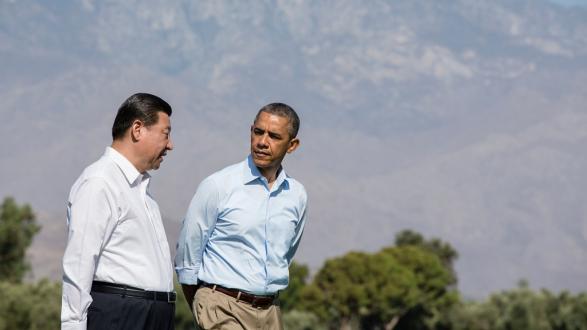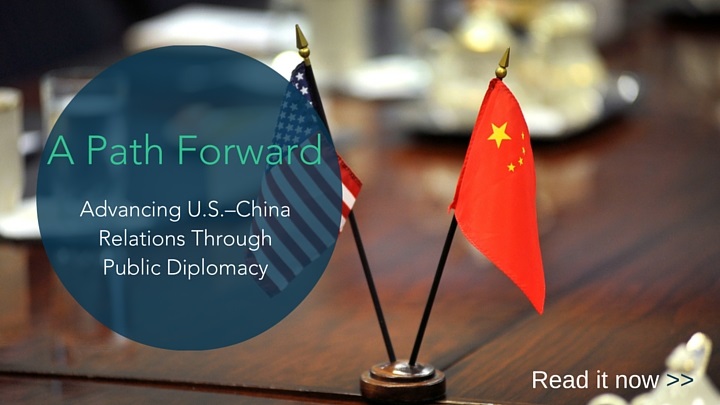The following is an excerpt from a new report by Pacific Council President and CEO Jerrold D. Green, Communications Associate Justin Chapman, and Events Officer Alexandre Moore on the role of public diplomacy in the U.S.-China relationship. The report was presented at the 2016 China-U.S. Diplomacy Summit held at Renmin University in Beijing on June 19, 2016. Read the report in full.
____________________
At the Pacific Council’s 2016 Spring Conference in April, Atman Trivedi, senior director for policy at the U.S. Department of Commerce Global Markets Bureau, said, "The relationship between China and Los Angeles is incredibly important. Chinese investment and tourism in Los Angeles County is a major driver for economic growth. Los Angeles is a gateway to U.S.-China international trade." Indeed, on trade, energy, business cooperation and investment, education, health care, tourism, and the environment, Los Angeles and California already have a unique relationship with China.
The entertainment industry is at the forefront. With China expected to surpass North America’s box office numbers by 2017, and with more Chinese money being invested in American studios and films, the entertainment industry’s connection with China is a vital piece of this puzzle. Entertainment, media, and creative services – with an ability to reach and influence hundreds of millions if not billions of people – could serve as an important tool in recasting our perceptions of one another.
This year the Chinese firm Dalian Wanda Group purchased Legendary Entertainment, which produced The Dark Knight, Jurassic World, and several other blockbusters, for $3.5 billion. Major Hollywood studios have been "aggressively pursuing film co-financing deals with Chinese companies, including Alibaba Pictures," according to the Los Angeles Times. Hollywood studios increasingly have Chinese audiences in mind when producing new films. There is a natural opportunity here to use entertainment as a medium for public diplomacy messaging. The more we learn about China and the more they learn about us, the more likely and able both sides will be to update narratives of one another and to begin a more meaningful and far deeper level of engagement.
Chinese investment in the United States could reach $200 billion by 2020.
Los Angeles is leading the way in many other areas as well. In May, the Los Angeles-based U.S.-China Cleantech Center (UCCTC) – a public-private partnership between the Innovation Center for Energy and Transportation and the U.S. Department of Commerce – hosted the U.S.-China Cleantech Innovation Forum, a series of conferences and exhibitions promoting bilateral cooperation in trade, culture, and the environment. About 200 Chinese and American government officials, business leaders, and clean energy and environmental policymakers attended the forum in Pasadena, California. "China and the United States, the two most powerful countries in the world, can work together and achieve global magnitude in clean technology," an article about the forum quotes Dr. Feng An, founder and executive director of UCCTC, as saying.
There are also a number of Chinese companies with operations headquartered in Los Angeles, such as the BYD Company. The Chinese automaker’s decision to produce electric buses in Lancaster, a city in Los Angeles County, is a good example of how the complex U.S.-China economic relationship can be mutually beneficial: Chinese companies gain access to the U.S. market, employ U.S. citizens, and offer a valuable product. In this specific instance the product being offered also contributes to local sustainability goals.
Peter Shiao of the Los Angeles Business Journal cited a new report by research firm Rhodium Group and the non-profit National Committee on U.S.-China Relations that found California is the top destination for Chinese direct investment. From 2000 through the end of 2015, 452 California businesses received $8 billion. "Chinese-owned businesses already directly employ almost 10,000 Californians, and indirect jobs through tourism and construction multiply that figure several times," wrote Shiao. Nationally, 90,000 American jobs are now directly tied to Chinese organizations based here in the United States.
Chinese investment in the United States could reach $200 billion by 2020, according to Rhodium economist Thilo Hanemann, with California – and Los Angeles especially – reaping the lion’s share of this investment. One need only look across the street from the Pacific Council’s offices for evidence of this massive trend of investment in Los Angeles: the new Metropolis building is being constructed by Chinese developer Greenland for $1 billion. Several other major mixed-use projects currently under construction in downtown Los Angeles are also financed by Chinese developers.
With so much Chinese capital at play, as well as this city’s sizable Chinese population, Los Angeles is uniquely positioned to influence China’s perception of the United States and of Americans and American’s perceptions of China and of the Chinese people.
On the environment, subnational government entities are already circumventing Beijing and Washington. California has been a leader on this front as well. Orville Schell of the Asia Society and Geoffrey Cowan of the Annenberg Retreat at Sunnylands and Pacific Council’s board of directors released a report last year highlighting the success of Chinese provinces and the state of California in partnering against climate change. In 2013, California Governor Edmund Brown, Jr., and China’s National Development and Reform Commission (NDRC) Vice Chairman Xie Zhenhua, China’s top climate official, signed a joint, historic memorandum of understanding to combat climate change.
"The fact that the National Development and Reform Commission of the People’s Republic of China is entering into an agreement with one of the fifty states reflects the important position of California not only in the economy, but in science, technology, and climate change initiatives," said Governor Brown before signing the agreement. "I see the partnership between China, between provinces in China, and the state of California as a catalyst and as a lever to change policies in the United States and ultimately change policies throughout the world."
It would be a mistake for China to engage only New York and Washington, D.C., in its relations with the United States, as the East Coast is only part of the story in terms of U.S. public diplomacy resources.
Also in 2013, presidents Obama and Xi met at Sunnylands in Southern California where, according to a press release from the historic estate, "the meetings resulted in stronger relationships between the two leaders, along with significant progress on several issues of bilateral importance, including cybersecurity, North Korea, and controlling rising hydrofluorocarbon emissions from industrial activities."
However, Schell said, "In the end if the United States and China do come together in a meaningful way to deal with climate change, it is not going to exclusively be between Washington and Beijing. In fact that may be the least important link. Where the rubber will really meet the road is with states and municipalities dealing directly, so that the solution ends up being more of a patchwork, kind of a mosaic, rather than some big grand design where the presidents wave a wand in Washington and Beijing and bring about a solution."
Los Angeles is already out in front on this and many other issues. It would be a mistake for China to engage only New York and Washington, D.C., in its relations with the United States, as the East Coast is only part of the story in terms of U.S. public diplomacy resources. Californians would be eager to cooperate on an initiative with China, along the lines of the state’s partnerships with other countries.
____________________
Dr. Jerrold D. Green is the President and Chief Executive Officer of the Pacific Council on International Policy. Read more about his background.
Justin Chapman is the Communications Associate of the Pacific Council on International Policy. Read more about his background.
Alexandre Moore is the Events Officer of the Pacific Council on International Policy. Read more about his background.





